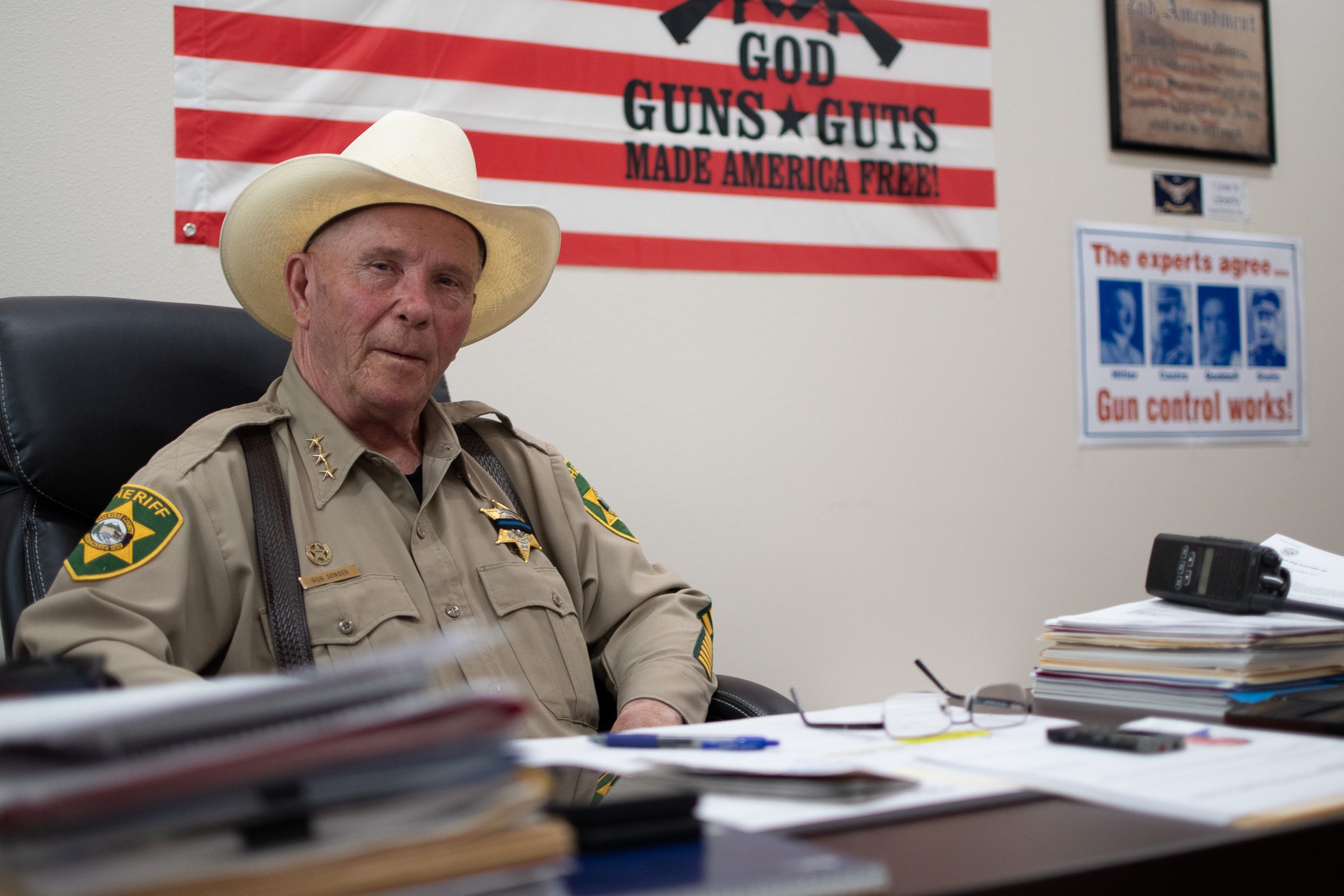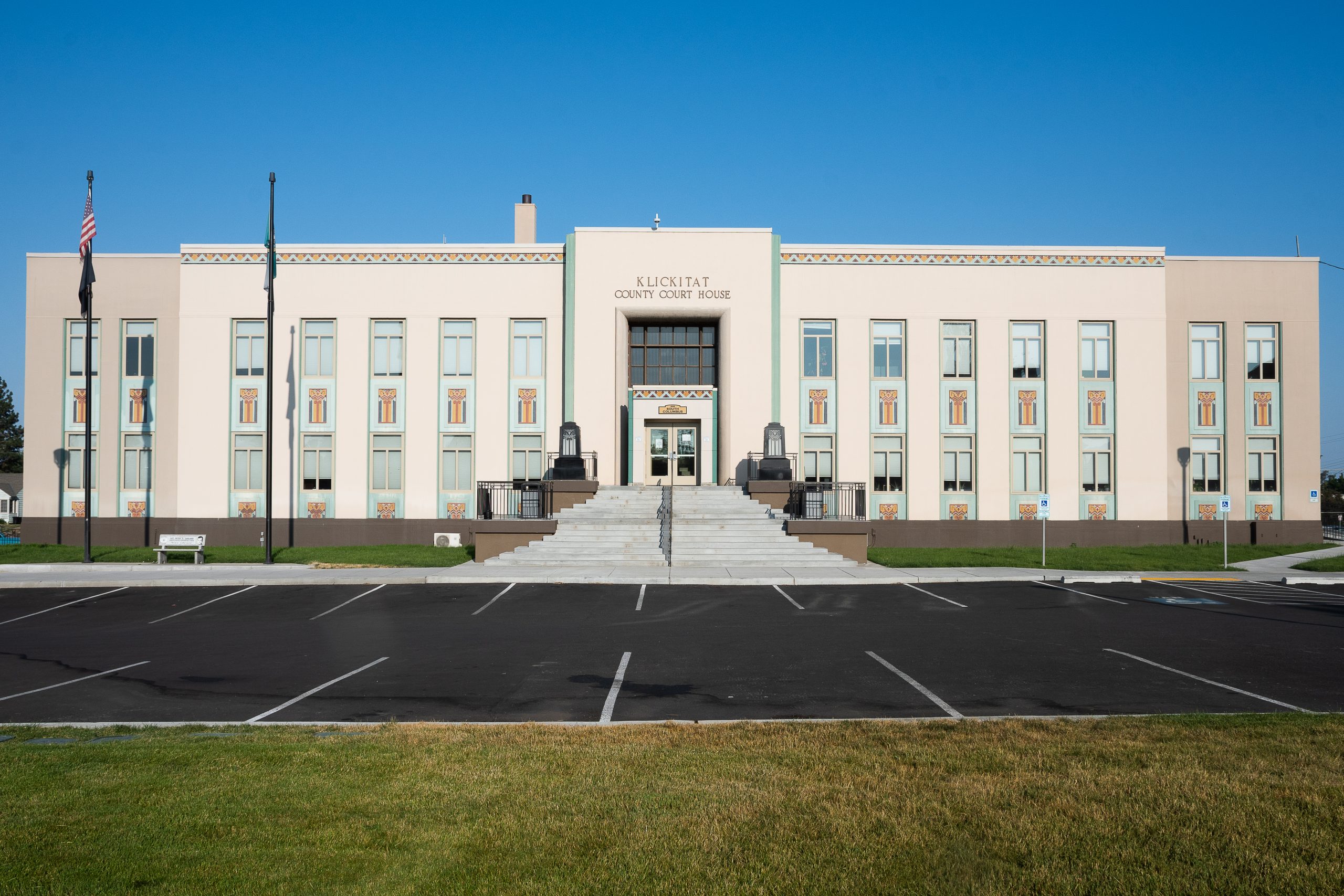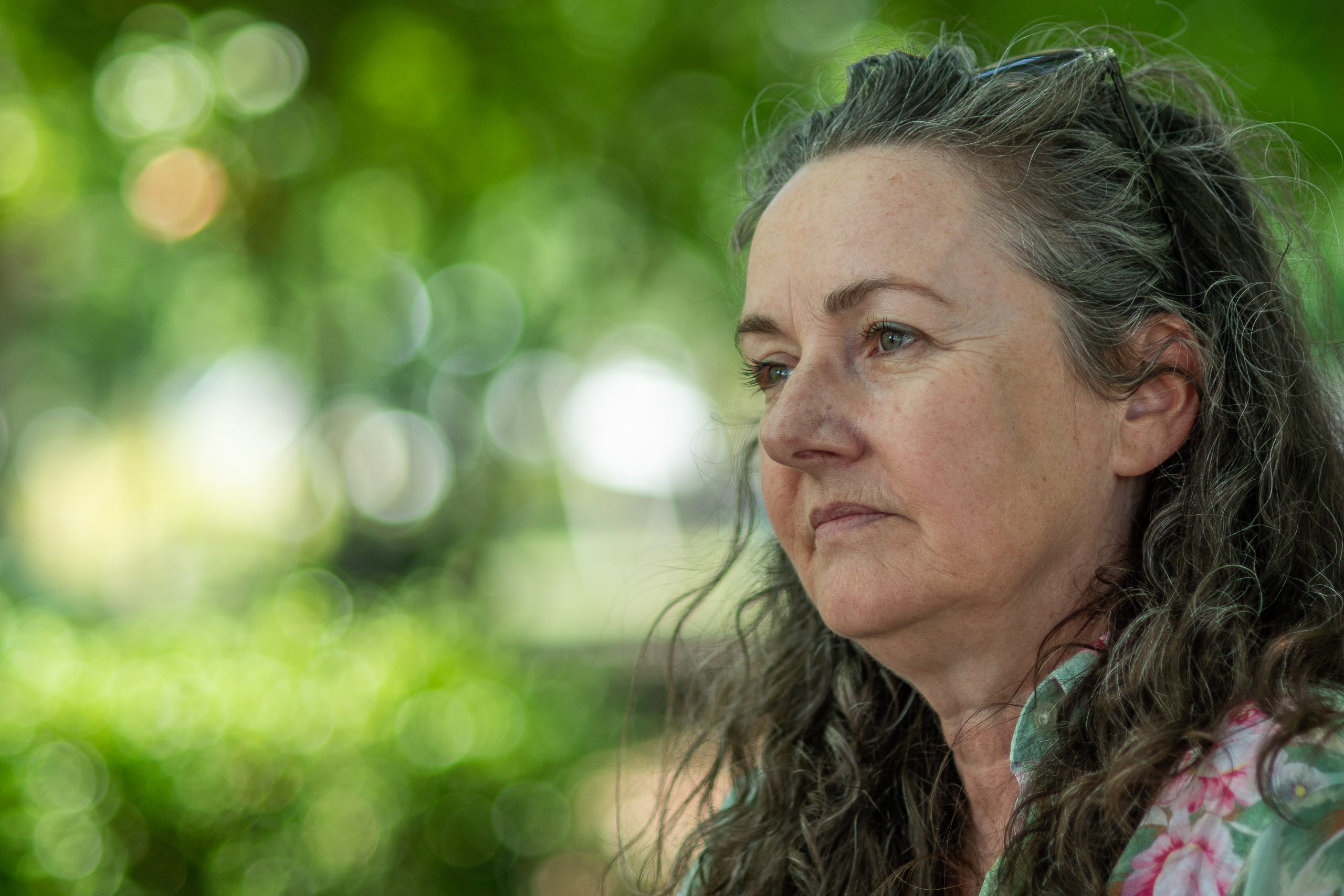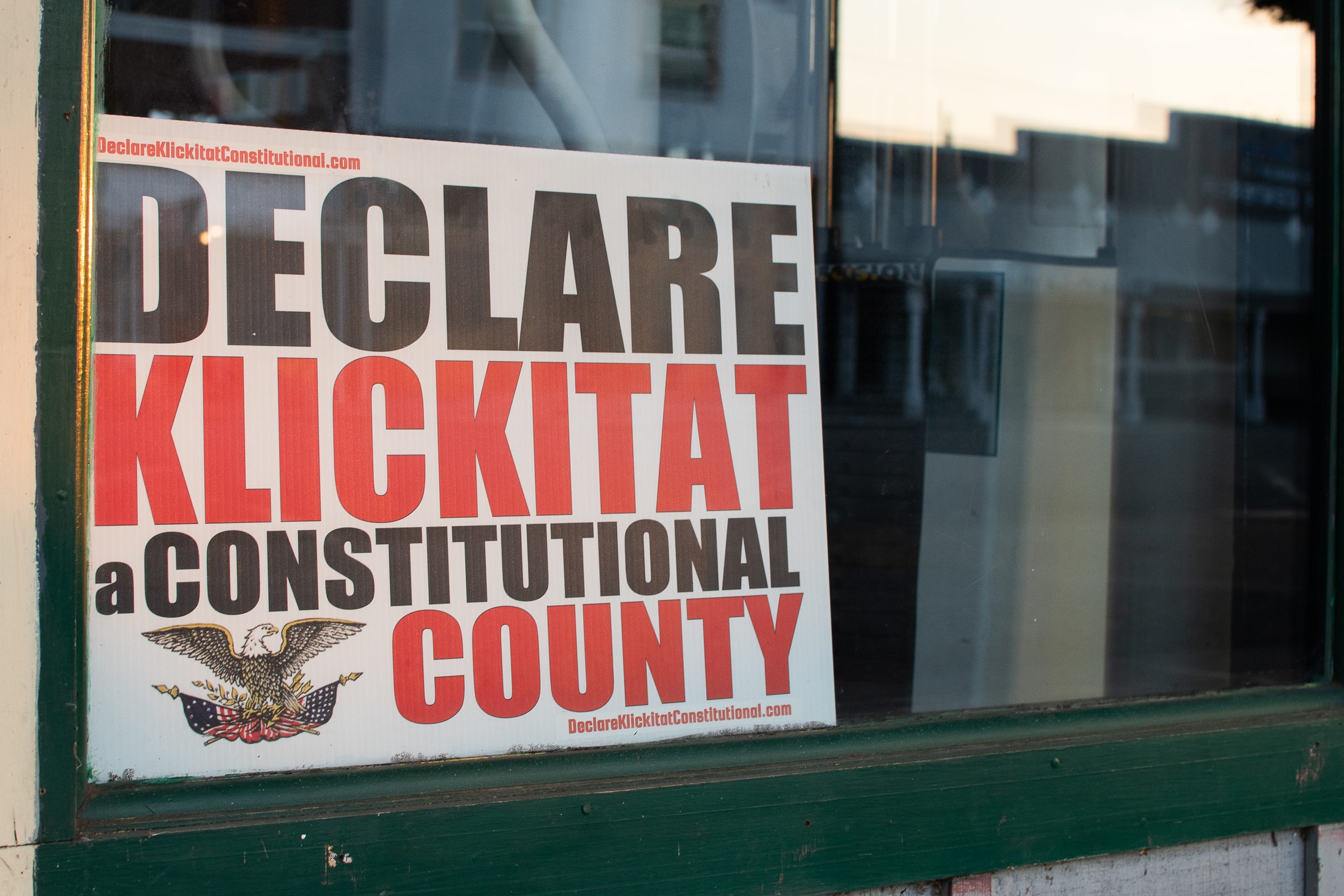EDS: This project, In the Sheriff We Trust, was produced by the Howard Center for Investigative Journalism, in collaboration with the Arizona Center for Investigative Reporting. The Howard Center is based at Arizona State University’s Walter Cronkite School of Journalism and Mass Communication and is an initiative of the Scripps Howard Fund in honor of the late news industry executive and pioneer Roy W. Howard. AZCIR is an independent, nonpartisan, nonprofit newsroom dedicated to statewide, data-driven investigative reporting.
- Slug: BC-CNS-Sheriffs Counties, 1800 words.
- 5 photos available (thumbnails, captions below).
- EDS: Publishable note on methodology available here.
By Isaac Stone Simonelli, Brendon Derr and Anisa Shabir
The Howard Center for Investigative Journalism and Arizona Center for Investigative Reporting
GOLDENDALE, Wash. – A sign urging residents to “Declare Klickitat County a Constitutional County” remains taped inside the window of a gym on the city’s main street, a lingering reminder of the controversial resolution that inflamed community divisions in 2021.
Two years on, debate over the measure — which aimed to prohibit the county from “infringing upon any constitutional rights,” chiefly those involving firearms — continues to reappear in public comment portions of county meetings in the southern Washington community.
Commissioners didn’t move the resolution forward, in part because they thought it was government overreach. But the public rebuke hasn’t stopped Klickitat County Sheriff Bob Songer, who drafted the resolution, from pushing the idea.
“As a sheriff, your only boss is the people that put you in office. It’s not the county commissioners, it’s not the governor, it’s not the state attorney general,” said Songer, who also acknowledged commissioners’ control over his budget. “Your primary job is to guarantee the God-given rights of the Constitution to the citizens you serve.”
In addition to his role as the top county law enforcement official, Songer is an advisory board member for the Constitutional Sheriffs and Peace Officers Association, or CSPOA. The group is labeled anti-government and extremist by national experts because it pushes an ideology that a sheriff’s power supersedes that of the state and federal government.
Klickitat County is one of at least a dozen U.S. counties influenced by CSPOA to consider constitutional county resolutions over the past two years, a monthslong investigation by the Arizona Center for Investigative Reporting and the Howard Center for Investigative Journalism found.
At least two of them—Lander and Elko counties in Nevada—have become official CSPOA constitutional counties, a step that includes a $2,500 lifetime fee paid directly to the sheriffs group.
The so-called constitutional county resolutions range from a simple reaffirmation of support for the constitutional rights of county residents to those, as in the case of Klickitat County’s proposed resolution, that purport to empower local government, including sheriffs, to refuse to enforce state and federal laws they interpret as unconstitutional.
At its core, the nascent movement builds off of Second Amendment sanctuary counties to attempt to shift power away from the state and federal government and into the hands of county leaders, including elected sheriffs. Experts contend the trend is designed to operate outside traditional government checks and balances, ultimately usurping democratic processes by interpreting what is and isn’t constitutional at the local level.
Such resolutions consume county leaders’ valuable time with issues that they have little, if any, control over, according to experts and community members interviewed by AZCIR and the Howard Center. Ultimately, they said, the propositions can hamper efforts by county officials to attend to other responsibilities, from infrastructure maintenance to economic development.
“The more they become deeply politicized over national projects, the more likely it is that those divisions will begin to pollute and interfere with their ability to reach agreement on more local, important projects for them,” said John Finn, a professor emeritus in the Department of Government at Wesleyan University, where he taught courses in constitutional theory and public law.
Finn is quick to point out that local government does play a role in shaping constitutional interpretations by the U.S. Supreme Court, such as when counties voice concerns about rulings though proclamations or declarations. But, he said, the vague declarations by constitutional counties—in what he called political grandstanding at best and attempts to undermine the authority of the federal government at worst—cross a line.
“The constitutional county plays out beyond rhetoric in just creating fear,” said Klickitat County resident Lynn Mason, who campaigned against Sheriff Songer during his 2022 reelection bid. “Songer really pushes that division in this county.”
Experts have voiced concerns about the so-called constitutional training CSPOA provides to members of the public, government officials and law enforcement. The group’s extensive training of Texas officers in 2022, for instance, drew regional and national attention, ultimately leading the state agency that oversees law enforcement education to ban CSPOA from offering future instruction for continuing education credit.
“What you have here is a kind of civic education that is deeply partisan, deeply ideological,” Finn said of the lectures. “There’s almost no relationship to on-the-ground reality.”
Still, bringing on Lander and Elko counties in Nevada as official CSPOA constitutional counties in 2021 was part of an evolving outlet of growth for the sheriffs group, marking what appeared to be a surge in constitutional county propositions.
Lander County was also the starting point for the “Arise USA: The Resurrection Tour,” a flashy national circuit that aimed to “save the republic” by promoting “constitutional counties, faith, family and freedom.”
The tour, which included CSPOA founder Richard Mack as a featured speaker, was organized by Robert David Steele, an ex-CIA officer known for his deeply antisemitic QAnon-style conspiracies, COVID-19 denialism and belief that the 2020 election was stolen from former President Donald Trump.
Steele was heavily invested in the idea of using the tour to push the constitutional county concept. In July 2021, he told an Elko County commissioner via email that Arise USA and CSPOA might convince as many 25 counties to adopt a constitutional county status that year.
A little more than a month later, he died of COVID-19.
Unlike a sheriff seeking to become a member of the Constitutional Sheriffs and Peace Officers Association, which does not make its membership public, a county government attempting to join the organization must face public comment and a vote by a board of elected officials.
Mark Bennett was in his third and final term as a Republican commissioner in Baker County, Oregon, in 2021 when he was faced with a resolution to support the rural community becoming a CSPOA county.
Bennett, who has more than 50 years of law enforcement and county government experience, said the measure was “extremely divisive within the community,” noting meetings that would normally draw three people drew overflow crowds of more than 70 residents.
There appeared to be a fundamental misunderstanding of the role of county government, he said. A commissioner’s time and energy is best spent on putting together a good budget, building a strong management team and developing good policies that benefit the day-to-day lives of residents, according to Bennett—not getting entangled in national-level social issues.
The constitutional county declaration eventually approved by Baker County commissioners was not the one originally submitted. The revised version stripped out any mention of joining CSPOA.
In meeting minutes, commissioners sought to rein in the original declaration, stressing that the final version merely reaffirmed the county’s dedication to constitutional principles, and that it “has no legal mandates.”
In Nevada, however, emails obtained by AZCIR/Howard Center reporters show that Elko County Commissioner Rex Steninger reached out to various contacts in an attempt to put teeth behind Elko’s constitutional county proclamation.
“Our CSPOA resolution says (constitutional) violations will be treated as criminal activity, but we have no county code making it a crime,” he wrote to Elko County Chief Civil Deputy District Attorney Rand Greenburg. “How can we fix that?”
After meeting resistance from Greenburg, Steninger contacted Sam Bushman, now CEO for the CSPOA, asking that Bushman put him in touch with the group’s legal team.
Bushman replied that he was working on getting a CSPOA attorney to contact him, though records don’t indicate he followed through. Neither Bushman nor Steninger responded to repeated requests seeking comment.
In Arizona, Mohave County Supervisor Hildy Angius similarly inquired about strengthening its constitutional county resolution before voting to adopt it in 2022.
“Should we put some more teeth in it to ensure we can fight things that come down the pike that may be against the Constitution?” she asked fellow county supervisors at a public meeting ahead of the vote.
The added language, identical to phrasing in other constitutional county resolutions reviewed by AZCIR and Howard Center reporters, stated: “Be it further resolved, that this Board will not authorize or appropriate government funds, resources, employees, agencies, contractors, buildings, detention centers or offices for the purpose of enforcing laws that unconstitutionally infringe on the people’s rights.”
Supervisor Buster Johnson noted that Mohave’s county attorney previously told the board such resolutions effectively had no legal bearing. But Chairman Ron Gould, who email records show was in contact with CSPOA at the time, agreed with Angius.
“I’m aware how the system works. I just disagree with the rulings that come down from the Supreme Court and don’t want to be bound to supporting their rulings,” he said.
The board voted 3-2 in favor of the resolution. The three supervisors who approved it—Gould, Angius and Travis Lingenfelter—all took part in an event organized by CSPOA in August 2021.
Though groups like CSPOA have broad influence in certain circles, they are not the only forces driving the spread of what experts say are extremist narratives.
Jon Lewis, a research fellow at George Washington University’s Program on Extremism, has found that the ecosystem of extremism is less centered “around groups and more around movements, narratives, grievances.”
Baker County’s Bennett pointed to the pandemic, which prompted a host of contentious government restrictions, as a galvanizing force for community members pushing to become a constitutional county. He also believes the momentum partially stemmed from fears related to broader changes rural Americans were seeing across the country—changes he said they don’t necessarily want, or perhaps don’t fully comprehend.
In many ways, Bennett understands where they’re coming from. But their attempts to handle these social issues at the local level are misguided, he said.
Facing pressure to adopt a constitutional county resolution in 2021, Commissioner Cody Davis of Mesa County, Colorado, expressed similar reservations about the approach, adding it was ripe for abuse.
He noted that when leaders on the other side of the aisle employed comparable tactics at the city level—declaring themselves sanctuary cities in an effort to circumvent federal immigration laws—he said he condemned the maneuvers.
“I spoke against that. I said, they’re ignoring the rule of law,” Davis said at the time. “When we want to do the same thing, but on the other side, it seems a bit hypocritical to say we need to ignore the rule of law now.”
Ultimately, Mesa County commissioners, like Klickitat, were not receptive to the resolution.
In Klickitat, Songer has vowed to revive the constitutional county proposal once the time is right. In a county led by a three-person commission, more favorable conditions could be just an election away.
“In small towns, in small counties, in Republican counties, they are so big on local control,” Mason said. “They feel like they own this county. And even the words they use—that this is their county, their territory, their guy. And that’s super disturbing because we’re local.”
– Reporters Adrienne Washington, Albert Serna Jr. and TJ L’Heureux of the Howard Center for Investigative Journalism contributed to this story.
_____________
Contact us at howardcenter@asu.edu, and info@azcir.org .
For more stories from Cronkite News, visit cronkitenews.azpbs.org.
^__=
Klickitat County Sheriff Bob Songer talks in his office in Goldendale, Wash., on July 5, 2023. Sheriff Songer is an advisory board member of the Constitutional Sheriffs and Peace Officers Association. (Photo by Isaac Stone Simonelli/AZCIR)
The Klickitat County Courthouse in Goldendale, Wash., is shown on July 6, 2023. Inside the courthouse is the office of Sheriff Bob Songer, an advisory board member of the Constitutional Sheriffs and Peace Officers Association. (Photo by Isaac Stone Simonelli/AZCIR)
Klickitat County resident Lynn Mason, shown here at a public park in White Salmon, Wash., frequently speaks out against Sheriff Bob Songer because of his involvement with the Constitutional Sheriffs and Peace Officers Association. She campaigned against Songer during his reelection in 2022. (Photo by Isaac Stone Simonelli/AZCIR)
A sign in support of Klickitat County adopting a constitutional county resolution rests in the window of a storefront in Goldendale, Wash., on July 5, 2023. The controversial resolution was submitted for consideration by Klickitat County Sheriff Bob Songer in 2022. (Photo by Isaac Stone Simonelli/AZCIR)
An anti-drug sign sits along Highway 197 in Klickitat County, Wash., on July 6, 2023. Sheriff Bob Songer takes a strong anti-drug stance in this rural county. (Photo by Isaac Stone Simonelli/AZCIR)




